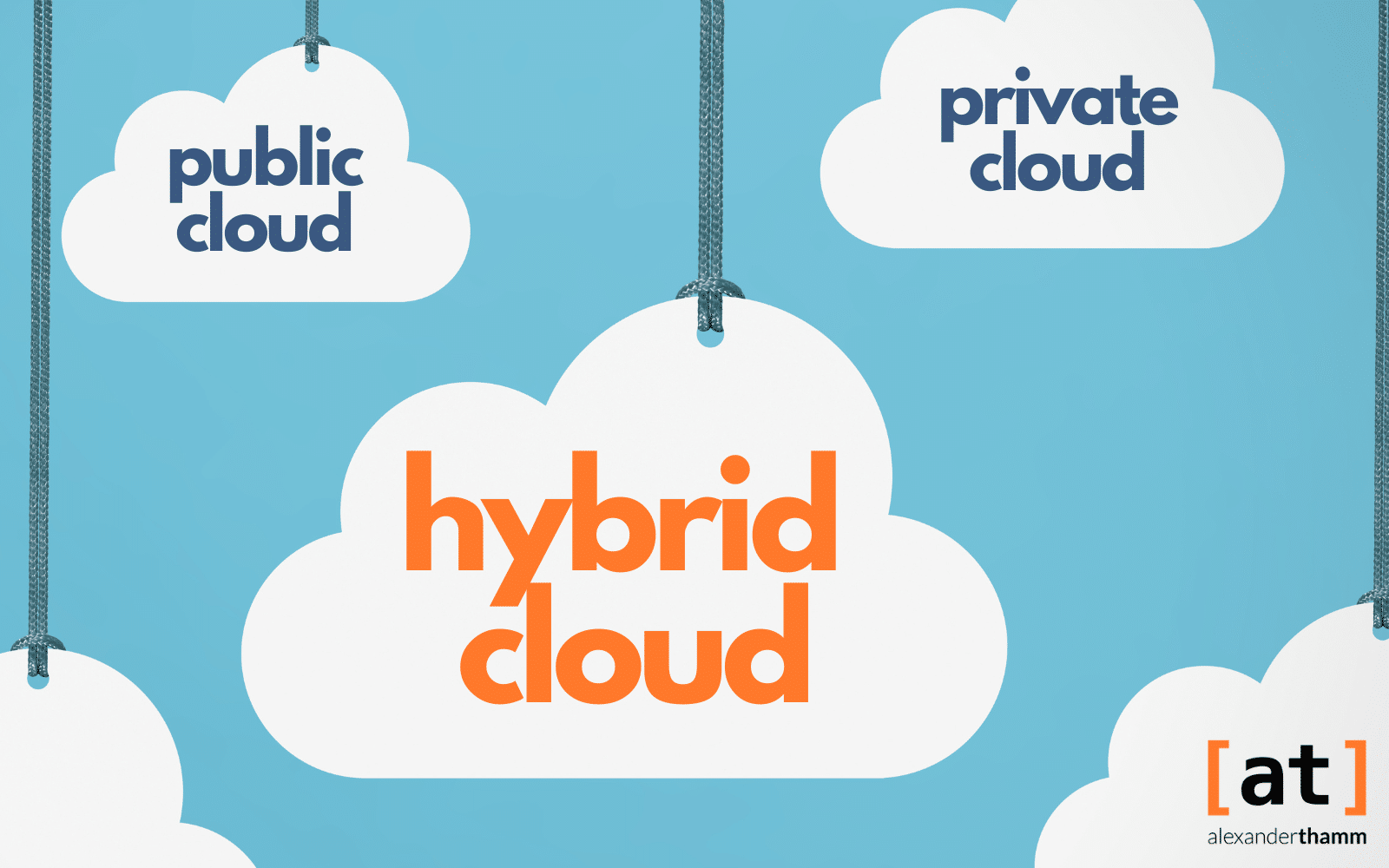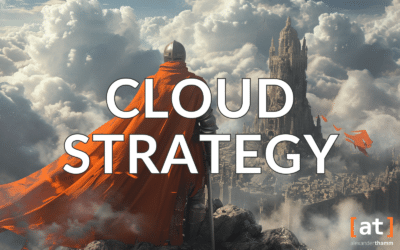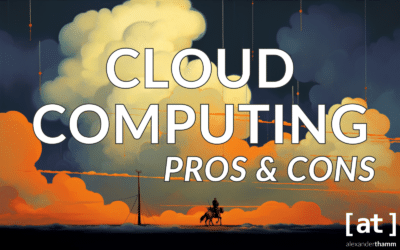Cloud technology has developed rapidly in recent years. The hybrid cloud in particular is becoming increasingly popular for companies that want to benefit from both public and private cloud structures. By using a functional hybrid cloud architecture, modern companies can optimise their resource allocation and thus act more flexibly. But how exactly does such a hybrid cloud infrastructure work, what advantages and disadvantages does it bring with it and what view into the future can be ventured with this technology? This article aims to clarify open questions and provide clarity.
Inhaltsverzeichnis
What is a Hybrid Cloud?
Hybrid Cloud refers to the Combination of public and private cloud infrastructure. Thereby applications and Data be moved back and forth between the different cloud models. Companies can thus benefit from the advantages of the public cloud, such as Scalability and flexibilitywithout exposing themselves to potential risks such as lack of control and security. At the same time, they can take advantage of the benefits of the private cloud, such as increased Security and controlwithout having to forego the flexibility and scalability of the public cloud.
How does a hybrid cloud work?
A hybrid cloud infrastructure consists of a network of private and public cloud systems, which are connected via a common technology platform are connected to each other. An important aspect of a hybrid cloud infrastructure is the ability to connect as needed, Move applications and data between cloud models. Private clouds, public clouds and local IT infrastructures can be linked together. By integrating multiple cloud models, companies can benefit from the advantages of each cloud technology while minimising the disadvantages. The different Cloud architectures are produced with the help of Programming interfaces (APIs) and other technologies with each other, so that uniform applications and Data management arise.

Cloud computing offers numerous advantages and functions for operational processes. Read all the relevant information about this technology in our introductory article:
What are the advantages and disadvantages of a hybrid cloud?
Advantages of the Hybrid Cloud:
- FlexibilityCompanies can access different resources at any time and adapt their infrastructure according to business requirements.
- ScalabilityThe hybrid cloud enables flexible adaptation of resources to respond to changes in the business environment.
- Cost saving: Using public cloud services can be cost-effective for businesses, especially for short-term projects or for running applications with fluctuating demand.
- Security: By using a private cloud for sensitive data and applications and a public cloud for non-critical data, companies can take advantage of both cloud architectures without compromising security.
Disadvantages of the Hybrid Cloud:
- Complexity: Integrating multiple cloud architectures can be a complex task that requires specialised skills and expertise.
- Dependence on third party suppliers: The use of public cloud services means that companies are dependent on external service providers, which can lead to dependencies and possible security risks.
- Data security: The use of public cloud services can lead to data security and privacy concerns as the data is stored outside the direct control of the company.
What are the differences to other cloud models?
Hybrid Cloud vs. Public Cloud
The public cloud is a cloud architecture in which IT resources and services are provided over the internet by a third-party provider. The advantages of the public cloud are scalability, flexibility and cost efficiency. Companies can adapt IT resources as needed and do not have to build their own IT infrastructure. The disadvantage is that the data is stored outside the company and control over the infrastructure is transferred to the third-party provider.
Essentially, the difference between hybrid cloud and public cloud is that the hybrid cloud is a combination of public and private cloud services, while the public cloud is solely run by a Cloud provider provided and shared by many different clients.
Hybrid Cloud vs. Private Cloud
Unlike the public cloud, where resources are public and can be used by anyone, in a private cloud only certain people or organisations are authorised to access the resources. A private cloud can either be operated by a company itself or by a third-party provider. In the first case, it is often referred to as an on-premises cloud, as it is installed on the company's own servers. In the second case, it is referred to as a hosted private cloud, which is managed by an external provider.
One advantage of the private cloud is that it offers more control and security, as it can only be used by authorised persons or organisations. In addition, specific requirements and needs of the company can be taken into account and implemented. However, operating and maintaining a private cloud is often more expensive than using a public cloud. In addition, it can be more difficult to find a scalable solution that meets the company's requirements.
In contrast, the hybrid cloud combines elements of both public and private cloud infrastructure. For example, highly confidential data or applications can be hosted within the private cloud, while less confidential applications or data are provided in the public cloud. By combining the two cloud models, the hybrid cloud enables more flexible and cost-effective use of cloud computing resources while maintaining control and security of data and applications.
Hybrid Cloud vs. Multi-Cloud
The hybrid cloud and the multi-cloud are two different approaches in the field of the Cloud computing.
A multi-cloud architecture combines several cloud environments with each other, such as public clouds, private clouds and/or on-premises clouds. This offers companies the opportunity to take advantage of different cloud models and distribute their resources accordingly. A multi-cloud can also help minimise downtime, as a disruption in one cloud environment does not necessarily impact all other environments.
The hybrid cloud is a combination of a private cloud and a public cloud environment that can work together and exchange data and applications between the two environments. The private cloud is usually used for business-critical or particularly sensitive data and applications, while the public cloud is used for less critical applications or data.
In summary, the hybrid cloud is a combination of public and private clouds, while the multi-cloud involves the use of multiple cloud platforms from different providers.
What are the application examples for the hybrid cloud?
A hybrid cloud architecture is used by companies from various industries. An example from the Automotive industry is the connection of production facilities and the central IT infrastructure. Another example from the Healthcare is the linking of patient data from different hospitals to ensure comprehensive, location-independent care. Also in the Retail the hybrid cloud can be used to E-commerce platforms and stationary points of sale with each other. In the Financial sector the hybrid cloud can be used to securely store sensitive data within an organisation while outsourcing data processing to public cloud platforms.
What are the benefits and challenges of implementation?
The integration of hybrid cloud solutions offers companies numerous advantages. Through the combination of private and public cloud, a Flexible and scalable IT infrastructure can be created that can be adapted to the individual needs of the company. The hybrid cloud also makes it possible, Reduce costsas only the necessary resources need to be rented or purchased.
However, when it comes to implementation, there are also Challenges, like the Integration of the various cloud systems and the Ensuring the Data security. Thorough planning and careful management are needed to ensure successful integration.

Cloud migration is the transfer of corporate data and content to the cloud. Find out more about the prerequisites, strategies and processes in our article:
What are tools and technologies for the hybrid cloud?
- VMware Cloud on AWSVMware Cloud on AWS is a solution that delivers VMware software in the AWS cloud. The combination enables VMware workloads to run in the cloud and move seamlessly between on-premises VMware infrastructure and AWS.
- Azure StackAzure Stack is an extension of Microsoft's Azure Cloud platform that enables companies to provide Azure services and applications in a private cloud environment. In doing so, Azure Stack resources can be connected to the public Azure Cloud.
- Google AnthosGoogle Anthos is a hybrid cloud solution that enables organisations to deploy applications on multiple cloud platforms, including AWS and Azure. With Anthos, developers can write and deploy applications in one environment and then run them on different clouds.
- IBM Cloud Pak for Integration: IBM Cloud Pak for Integration is a solution that helps organisations integrate applications and data between different cloud platforms. The solution includes API integration, event processing and data integration tools that enable organisations to create and manage a hybrid cloud architecture.
How secure is the hybrid cloud?
Security is a key issue when using cloud solutions. In the hybrid cloud, companies must ensure that their data and applications are securely stored and transferred in both the private and public cloud. To ensure this, companies must take appropriate security measures, such as the encryption of data and the use of firewall systems. It is also important that the company's employees are trained on the risks and best practices when dealing with hybrid cloud solutions.

Data security and data protection are central functions for securing operational data and value chains. Protect yourself in the best possible way and get comprehensive advice on this topic:
Data security - the most important basics on the topic of data security
What are the current trends and developments?
One trend that has emerged recently is the increased use of Container technologies like Kubernetes in hybrid cloud environments. These enable efficient management and orchestration of applications running on different cloud platforms. Another trend is the increased use of AI technologiesto improve the performance and efficiency of hybrid cloud systems. AI tools can be used, for example, to optimise resource allocation and automatically make decisions about which applications to run in which cloud platform.
Another current topic is the Edge cloud system development. These are cloud systems that are positioned directly at the edge of the network and thus enable fast processing of data and applications. These systems are becoming increasingly important as more and more data needs to be processed in real time, for example, in order to autonomous driving or to enable Industry 4.0

The importance of artificial intelligence for the competitiveness of the economy continues to grow. Learn more about the role of AI in Industry 4.0:
What are the potentials and opportunities for companies?
By using hybrid cloud systems, companies can benefit from numerous advantages. A hybrid cloud makes it possible to use the strengths of different cloud platforms and thus achieve a Optimal adaptation to the individual needs and requirements of the company guarantee. Companies can thus always and constantly react to changes in the market and in their own industry. In addition, a hybrid cloud can be a Better scalability and long-term fail-safety of applications ensure.
However, there are also some challenges to overcome when implementing hybrid cloud systems, such as the complexity of the systems and ensuring data protection and cyber security. Companies need to plan and prepare carefully in order not to create unnecessary security risks with the use of hybrid cloud architecture.
Overall, however, hybrid cloud technology offers companies great potential and opportunities to optimise their business processes and achieve competitive advantages.
Do you have questions about the integration of cloud services in your company? Then please do not hesitate to contact us. We are happy to be at your disposal at any time and offer non-binding advice.











0 Kommentare